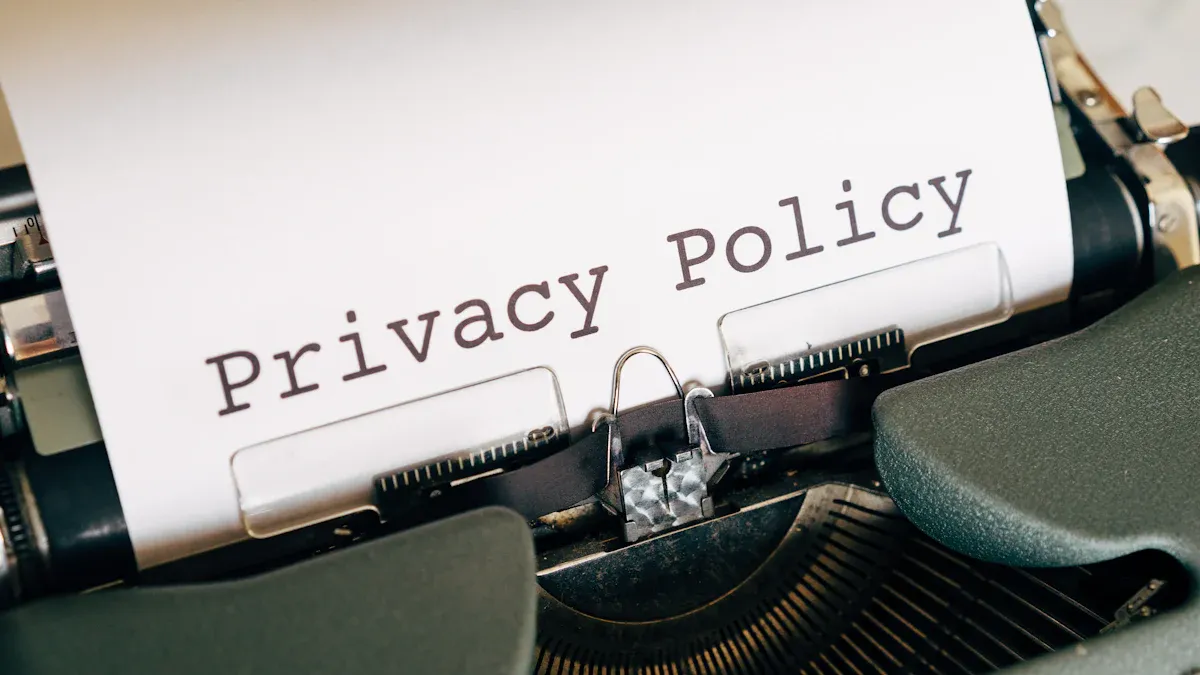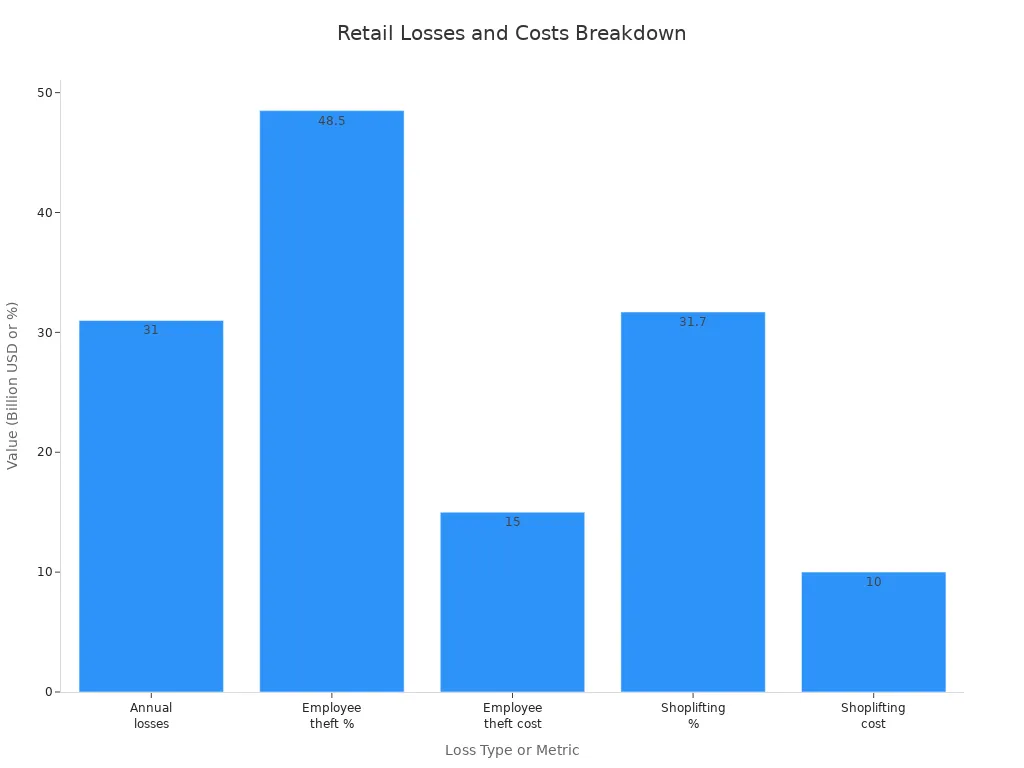Security & Privacy in AI Retail Stores: How to Build Trust

You want to feel safe when shopping in stores that use AI. Security & Privacy matter to you because your personal data should stay protected. Maybe you worry about how stores use your information or if they share it without asking. When a store puts privacy at the heart of its AI systems from the start, you see that they care about keeping your data safe. This builds trust and helps you feel confident every time you shop.
Key Takeaways
Trust is key in AI retail. When stores protect your data and explain their practices, you feel safe and are more likely to return.
Transparency builds confidence. Stores should clearly communicate how they use AI and your personal information to keep you informed.
Strong data protection measures are essential. Look for stores that use encryption and privacy-by-design methods to safeguard your information.
Your feedback matters. Stores that listen to your concerns about privacy and security can improve their practices and build trust.
Ethical AI use is crucial. Stores must ensure fairness and avoid bias in their AI systems to treat all customers equally.
Trust in AI Retail

Customer Loyalty
When you walk into an AI-powered store, you want to feel like the store knows you but also respects your privacy. Trust plays a big role in how you feel about shopping there. If you trust the store, you are more likely to come back and even tell your friends about it. Studies show that trust in AI retail stores connects directly to customer loyalty. When you feel safe and see that the store uses your data carefully, your satisfaction grows. This satisfaction leads to loyalty. Stores that use AI to personalize your shopping experience—like suggesting products you might like—make you feel special. As trust increases, you enjoy shopping more and want to return.
You might wonder what makes you trust an AI retail store. Here are some important factors:
Data privacy: Most people worry about how their data is used. You want to know your information stays safe.
Transparency: You feel better when stores explain how they use AI and your data.
Psychosocial factors: Things like what your friends think, your own comfort with AI, and how much control you feel you have all matter.
When stores focus on these areas, they build a strong bond with you.
Brand Reputation
A store’s reputation depends on how well it protects your information. If you hear about a store keeping your data safe, you are more likely to trust it. Good security and privacy measures help stores stand out. Let’s look at some real results:
Evidence Type | Description |
|---|---|
Theft Reduction | High-end fashion stores saw a 20% drop in theft after improving security. |
Customer Feedback | Stores working with law enforcement got 40% more positive feedback. |
Customer Retention | Better security led to 50% more customers coming back to shop again. |
When you see a store taking these steps, you know they care about your safety. Security & Privacy are not just rules—they help stores earn your trust and build a great reputation.
Security & Privacy Concerns

Data Misuse
You trust stores with your personal information, but sometimes things go wrong. In AI retail stores, data misuse can happen in many ways. Hackers might try to steal your data, or someone could use it for reasons you never agreed to. Here are some of the most common problems you might face:
AI-powered business logic abuse makes up over 30% of automated attacks. This means someone uses the store’s own systems to cheat, like changing prices or skipping security steps.
API breaches cause 16% of daily problems in AI retail. These breaches can let attackers get into private data.
Every day, stores report over half a million AI-driven attacks. Business logic abuse is the top issue, followed by DDoS attacks (30.6%) and bad bots (20.8%).
Bad bots can scrape prices or try to steal your login details.
You want stores to keep your data safe and stop these attacks before they hurt you.
Transparency Issues
You deserve to know how stores use AI and your data. Many people feel nervous when they do not understand what is happening behind the scenes. In fact, 74% of shoppers want to be told when vision AI is used in a store. About 72% think AI should be more open in all retail areas.
Consumers are increasingly wary of technologies they don't understand. A lack of transparency in AI can erode trust in both the retailer and the technology itself.
When stores hide how AI works, you might lose trust. Security & Privacy depend on clear communication. You feel better when you see signs or get information about how your data is used.
Ethical AI Use
You want AI to treat everyone fairly. Sometimes, AI systems can make mistakes or show bias. For example, an MIT study found that facial recognition systems have a false match rate of 0.8% for lighter skin tones but 34.7% for darker skin tones. This shows that AI can be unfair if not checked carefully.
Only 8% of retail leaders feel sure they can control their AI models. That means many stores struggle to use AI responsibly. Also, just 51% of shoppers feel comfortable with how stores handle their data. You want stores to use AI in ways that respect your rights and protect your privacy.
Here is a quick look at the top concerns people have in AI retail stores:
Concern Type | Description |
|---|---|
Data Collection and Storage | Retailers must ensure secure collection and storage of personal data to protect against breaches. |
Personal Identification Risks | Measures should be implemented to minimize the risk of identifying individuals through surveillance. |
Compliance with Privacy Laws | Retailers need to be aware of and comply with varying privacy laws across jurisdictions. |
Informed Consent | Customers should be informed about surveillance and consent to data collection through signage. |
Bias in AI Systems | Identifying and mitigating biases in AI algorithms is crucial to prevent discrimination. |
Security & Privacy concerns are real, but when stores address them, you can shop with confidence.
Building Trust Strategies
Data Protection
You want to know your information stays safe every time you shop. AI retail stores use strong data protection tools to keep your details private. They use things like encryption, secure storage, and privacy-by-design methods. These steps help stop hackers from stealing your data or using it in ways you do not like.
Here are some of the top technologies stores use to protect your data:
Technology | Description |
|---|---|
Makes AI decisions clear and easy to understand. | |
Blockchain and decentralized storage | Stores your data in many places, not just one, making it harder for hackers to break in. |
Differential Privacy | Hides your personal details by mixing them up, but still lets stores see shopping patterns. |
Homomorphic Encryption | Lets stores use your data without ever seeing it, keeping your info private during processing. |
Zero-Knowledge Proofs | Proves something is true without showing your actual data. |
Stores also follow privacy-by-design rules. This means they think about Security & Privacy from the very start. They only collect the data they need and use synthetic data when possible. Before using your data, they check for risks and put safeguards in place. You can feel more confident knowing these protections are always working for you.
Transparent Practices
You deserve to know how stores use AI and your data. When stores are open about their AI systems, you feel more in control. They tell you when they use AI to track your shopping or make recommendations. You can even choose to opt out of some features or correct your data if something is wrong.
Let customers shape their AI experience by giving them choices: to opt out of personalization, correct data assumptions, or set preferences about recommendations.
Stores build trust by showing you exactly how they use your information. They post clear signs, send easy-to-read notices, and answer your questions. Many stores also run regular audits and share the results with you. This way, you always know what is happening with your data.
Here are some ways stores make their practices more transparent:
They tell you when AI is being used in the store.
They explain how your personal information will be used.
They let you set your own privacy preferences.
When you see these steps, you know Security & Privacy are a top priority.
Ethical Standards
You want stores to use AI in a fair and honest way. Ethical standards help make sure AI treats everyone equally and keeps your rights safe. Stores set up rules to avoid bias, protect your privacy, and make sure you can understand how AI makes decisions.
Here is a table showing the main ethical principles stores follow:
Ethical Principle | Description |
|---|---|
Bias and Fairness | AI should not treat people unfairly based on who they are. |
Privacy | Your sensitive data stays protected, even when AI personalizes your shopping. |
Transparency and Explainability | You can understand how AI makes choices about you. |
Accountability | Stores take responsibility if something goes wrong with AI. |
Ethical Design and Development | Stores think about ethics from the start, not just at the end. |
Bias Detection and Mitigation | Stores check for and fix unfairness in AI systems. |
Enhancing Data Privacy | Stores use new tools to keep your data safe and private. |
Stores also map out everyone who might be affected by AI, check for risks, and set up clear rules for fairness and transparency. They follow global standards and make sure every team member knows the rules. This way, you can trust that Security & Privacy are built into every step.
Customer Feedback
Your voice matters. Stores listen to what you say about privacy and security. They use surveys, chatbots, and even social media to hear your thoughts. When you share your concerns, stores can make changes to protect your data better.
Stores often ask for your consent before collecting your information. This gives you control over what you share. They also review their security every year to make sure they meet your needs. If you have questions about video cameras or how your data is used, stores explain everything clearly.
Here are some ways stores use your feedback:
They update privacy policies based on what you tell them.
They improve how they collect and store your information.
They make sure you always know what is happening with your data.
When you see stores listening and acting on your feedback, you know Security & Privacy are not just words—they are promises.
Real-World Examples
Case Study
Let’s look at how a big retail chain used AI to boost your shopping safety. This store wanted to stop theft and protect your data. They set up smart cameras and AI tools that spot suspicious actions fast. When someone tries to steal, the system sends an alert to security in seconds. You get a safer store, and your personal info stays private.
Here’s what happened after they put these new systems in place:
Outcome | Measurement |
|---|---|
Reduction in shrinkage | |
Accuracy in detecting suspicious behavior | 90% accuracy |
Acceleration of fraud investigations | 50% faster response time |
You can see how these changes make a real difference. The store lost less money to theft and solved problems faster. AI also helped staff focus on helping you, not just watching for trouble.

Industry Insights
You might wonder what top stores do to keep your trust. Here are some best practices you’ll find in leading AI retail shops:
They use ethical AI that is fair and open.
They follow privacy laws like GDPR and CCPA.
They use strong encryption to protect your data.
They let you know how your data is used and always ask for your consent.
They have people check AI decisions to avoid mistakes.
Stores also use AI for things like heat mapping and people counting. This helps them make your shopping trip better, but they always need to balance these tools with your privacy. Many shoppers now expect clear rules about Security & Privacy. When stores show you how they protect your data, you feel safer and more willing to share information for a better experience.
You can build trust in AI retail by focusing on Security & Privacy from the start. Stores that use clear privacy policies, strong data protection, and regular audits help you feel safe.
Transparency about how AI works and how your data is used keeps you in control.
Ongoing customer feedback shapes better experiences.
As AI grows, you will see smarter security and more ways to protect your information. The future of shopping will put your trust first.
FAQ
How do AI retail stores keep my data safe?
Stores use strong encryption and secure storage. You see privacy signs and get choices about your data. Staff check systems often to stop hackers. Your information stays protected with these tools.
Can I control what data stores collect about me?
Yes! You can set your privacy preferences. Stores let you opt out of some features. You choose what to share. If you have questions, staff help you change your settings.
What happens if there is a data breach?
Stores act fast. They alert you and fix the problem. You get updates about what happened. Staff work to protect your information and prevent future breaches.
Are AI systems always fair to everyone?
AI can make mistakes. Stores test their systems for bias. You can report problems if you see unfair treatment. Stores want to treat everyone equally.
Do stores use my data for advertising?
Some stores use your data to show you ads. You can ask how your data is used. Stores must tell you and let you opt out if you want.
See Also
Understanding AI-Driven Convenience Stores: Key Insights for Retailers
The Future of Retail: Embracing AI-Enhanced Store Concepts
Launching an AI-Driven Corner Store on a Budget
Revolutionizing Online Retail Management with AI Tools
Examining Self-Checkout at Walgreens: Benefits and Obstacles
